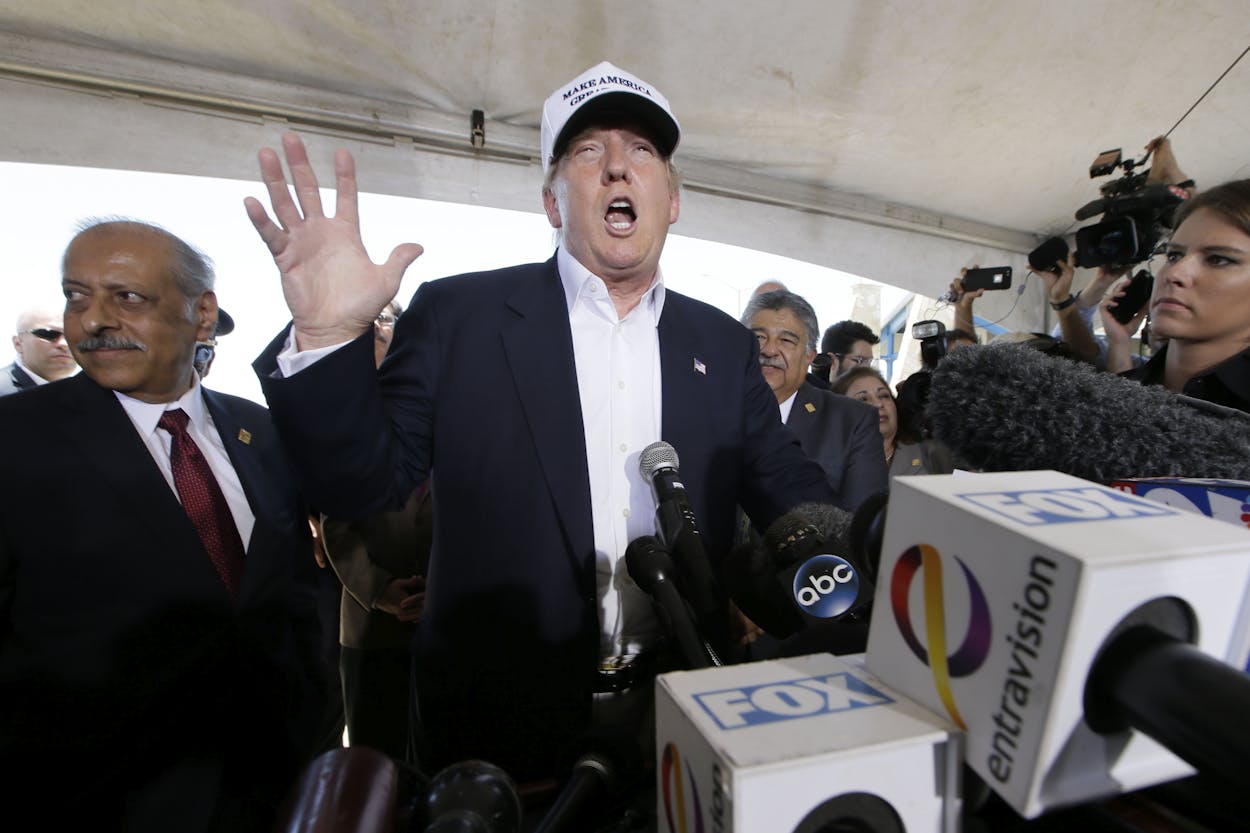Dear Donald Trump,
You’ve reminded us countless times throughout your presidential campaign that you’re a very successful businessman. So, let’s talk business. In June, McAllen — a city that entered the national consciousness after federal agents dropped thousands of Central American children at its bus station — threw a launch party. It was the debut of “Discover McAllen,” a smartphone app only available in Spanish. There are several sections, including puentes (bridges), hospedaje (lodging) and compras (shopping) — all the information someone coming to the border town would want to know. But it targets a specific group: Mexicans.
Maybe you don’t know, Mr. Trump, but Texas has no income tax. So McAllen relies on sales tax to generate city revenue — and they’re doing pretty well! It’s funded several big-dollar projects such as convention and performing arts centers that are both worth millions. About 37 percent of the city’s overall sales tax revenue comes from Mexican shoppers, so creating an app catering to them is one way to keep that pipeline open. As Rebecca Olaguibel, the city’s retail and business development director, told The Monitor in May: “We want to keep inviting them to McAllen.” Makes sense, huh?
The app highlights how connected the two sides of the U.S.-Mexico border are, and how McAllen, other cities in the Rio Grande Valley, and communities along the border have benefited from the relationship. But there seems to be a bit of disconnect between that reality and your political talking points.
You’ve made it clear, for instance, that you don’t think Mexicans should be welcomed across the border, calling them “rapists.” When you visited Laredo –– about three hours west of McAllen –– last week as part of your presidential campaign, you said the border needed a wall. Even when Laredo City Manager Jesus Olivares responded that he didn’t believe that was necessary, you didn’t change your tune, continuing to spout that a wall was needed “in sections,” according to The New York Times.
Your comments are largely directed at people who immigrated to the U.S. without documents, and McAllen’s shoppers, meanwhile, typically only stay for a few days, then return. But your language encompasses all Mexicans: You think they’re criminals.
So why would the city invite them?
Beyond the reliance on sales tax, the border’s international bridges should appeal to your fine-tuned business sense, as cities have invested time and money in getting more and more Mexican visitors across in less time. In the Valley, Mexican shoppers cross the bridges on weekends, Black Friday, or in particularly high numbers during Semana Santa, the Holy Week holidays. Traffic stretches back over the bridge, to the point where workers at the Anzalduas-Reynosa International Bridge hand out water during high-traffic days, as Customs and Border Protection agents perform inspections. So bridge owners, both cities and private companies, have come up with a way to expedite the process.
Starting in 2014, the Valley’s international bridges were part of a federal pilot program that allowed the bridge’s owners to takeover CBP agents’ overtime pay. Before, the CBP could only accept federal dollars. A bill to make the program more permanent is working its way through Congress, and the Texas legislature passed a similar measure this session, according to The Monitor.
Although the ability to pay for federal workers’ overtime helps get travelers across, the main draw is commercial traffic, particularly heading back south after the trucks finish unloading their product. At the Pharr-Reynosa International Bridge, the driver of a six-axle vehicle pays $25.25, while the driver of a sedan pays $3.25. But once that sedan crosses into the U.S., officials hope its passengers dine at the Valley’s restaurants, shop at its malls and sleep in its hotels. And McAllen’s downtown aims to attract these shoppers — most of the stores only have signs in Spanish.
But that’s a border you probably don’t want to see, Mr. Trump. During your visit to Laredo, you continually said it was “dangerous” for you to be there. Although that may score political points elsewhere, it doesn’t accurately reflect the area you visited. Texas and Mexico are linked economically. You’re a businessman; that shouldn’t be a hard sell.
(image via AP/LM Otero)






